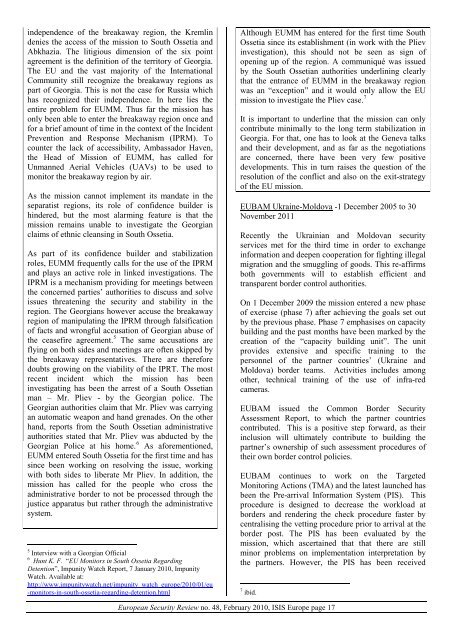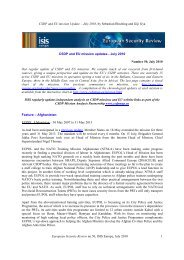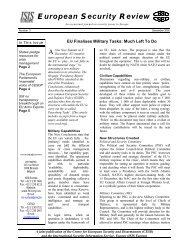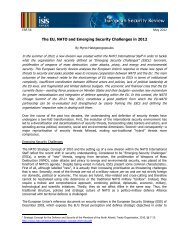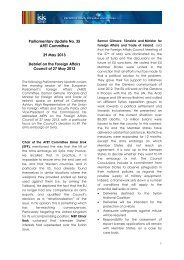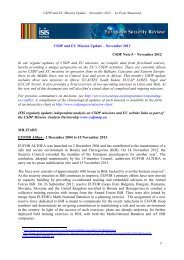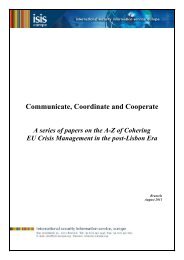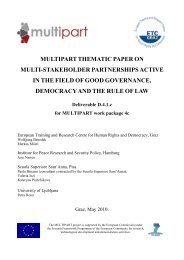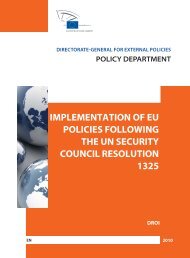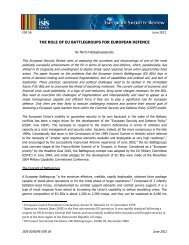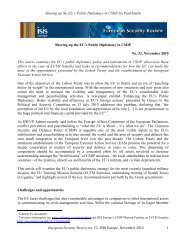ISIS Europe News In This Issue
ISIS Europe News In This Issue
ISIS Europe News In This Issue
Create successful ePaper yourself
Turn your PDF publications into a flip-book with our unique Google optimized e-Paper software.
independence of the breakaway region, the Kremlin<br />
denies the access of the mission to South Ossetia and<br />
Abkhazia. The litigious dimension of the six point<br />
agreement is the definition of the territory of Georgia.<br />
The EU and the vast majority of the <strong>In</strong>ternational<br />
Community still recognize the breakaway regions as<br />
part of Georgia. <strong>This</strong> is not the case for Russia which<br />
has recognized their independence. <strong>In</strong> here lies the<br />
entire problem for EUMM. Thus far the mission has<br />
only been able to enter the breakaway region once and<br />
for a brief amount of time in the context of the <strong>In</strong>cident<br />
Prevention and Response Mechanism (IPRM). To<br />
counter the lack of accessibility, Ambassador Haven,<br />
the Head of Mission of EUMM, has called for<br />
Unmanned Aerial Vehicles (UAVs) to be used to<br />
monitor the breakaway region by air.<br />
As the mission cannot implement its mandate in the<br />
separatist regions, its role of confidence builder is<br />
hindered, but the most alarming feature is that the<br />
mission remains unable to investigate the Georgian<br />
claims of ethnic cleansing in South Ossetia.<br />
As part of its confidence builder and stabilization<br />
roles, EUMM frequently calls for the use of the IPRM<br />
and plays an active role in linked investigations. The<br />
IPRM is a mechanism providing for meetings between<br />
the concerned parties’ authorities to discuss and solve<br />
issues threatening the security and stability in the<br />
region. The Georgians however accuse the breakaway<br />
region of manipulating the IPRM through falsification<br />
of facts and wrongful accusation of Georgian abuse of<br />
the ceasefire agreement. 5 The same accusations are<br />
flying on both sides and meetings are often skipped by<br />
the breakaway representatives. There are therefore<br />
doubts growing on the viability of the IPRT. The most<br />
recent incident which the mission has been<br />
investigating has been the arrest of a South Ossetian<br />
man – Mr. Pliev - by the Georgian police. The<br />
Georgian authorities claim that Mr. Pliev was carrying<br />
an automatic weapon and hand grenades. On the other<br />
hand, reports from the South Ossetian administrative<br />
authorities stated that Mr. Pliev was abducted by the<br />
Georgian Police at his home. 6 As aforementioned,<br />
EUMM entered South Ossetia for the first time and has<br />
since been working on resolving the issue, working<br />
with both sides to liberate Mr Pliev. <strong>In</strong> addition, the<br />
mission has called for the people who cross the<br />
administrative border to not be processed through the<br />
justice apparatus but rather through the administrative<br />
system.<br />
5 <strong>In</strong>terview with a Georgian Official<br />
6 Hunt K. F. “EU Monitors in South Ossetia Regarding<br />
Detention”, Impunity Watch Report, 7 January 2010, Impunity<br />
Watch. Available at:<br />
http://www.impunitywatch.net/impunity_watch_europe/2010/01/eu<br />
-monitors-in-south-ossetia-regarding-detention.html<br />
Although EUMM has entered for the first time South<br />
Ossetia since its establishment (in work with the Pliev<br />
investigation), this should not be seen as sign of<br />
opening up of the region. A communiqué was issued<br />
by the South Ossetian authorities underlining clearly<br />
that the entrance of EUMM in the breakaway region<br />
was an “exception” and it would only allow the EU<br />
mission to investigate the Pliev case. 7<br />
It is important to underline that the mission can only<br />
contribute minimally to the long term stabilization in<br />
Georgia. For that, one has to look at the Geneva talks<br />
and their development, and as far as the negotiations<br />
are concerned, there have been very few positive<br />
developments. <strong>This</strong> in turn raises the question of the<br />
resolution of the conflict and also on the exit-strategy<br />
of the EU mission.<br />
EUBAM Ukraine-Moldova -1 December 2005 to 30<br />
November 2011<br />
Recently the Ukrainian and Moldovan security<br />
services met for the third time in order to exchange<br />
information and deepen cooperation for fighting illegal<br />
migration and the smuggling of goods. <strong>This</strong> re-affirms<br />
both governments will to establish efficient and<br />
transparent border control authorities.<br />
On 1 December 2009 the mission entered a new phase<br />
of exercise (phase 7) after achieving the goals set out<br />
by the previous phase. Phase 7 emphasises on capacity<br />
building and the past months have been marked by the<br />
creation of the “capacity building unit”. The unit<br />
provides extensive and specific training to the<br />
personnel of the partner countries’ (Ukraine and<br />
Moldova) border teams. Activities includes among<br />
other, technical training of the use of infra-red<br />
cameras.<br />
EUBAM issued the Common Border Security<br />
Assessment Report, to which the partner countries<br />
contributed. <strong>This</strong> is a positive step forward, as their<br />
inclusion will ultimately contribute to building the<br />
partner’s ownership of such assessment procedures of<br />
their own border control policies.<br />
EUBAM continues to work on the Targeted<br />
Monitoring Actions (TMA) and the latest launched has<br />
been the Pre-arrival <strong>In</strong>formation System (PIS). <strong>This</strong><br />
procedure is designed to decrease the workload at<br />
borders and rendering the check procedure faster by<br />
centralising the vetting procedure prior to arrival at the<br />
border post. The PIS has been evaluated by the<br />
mission, which ascertained that that there are still<br />
minor problems on implementation interpretation by<br />
the partners. However, the PIS has been received<br />
7 ibid.<br />
<strong>Europe</strong>an Security Review no. 48, February 2010, <strong>ISIS</strong> <strong>Europe</strong> page 17


